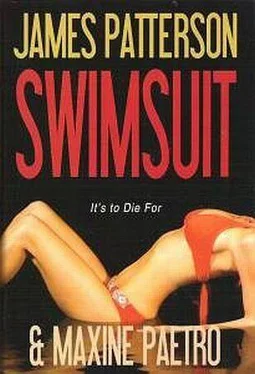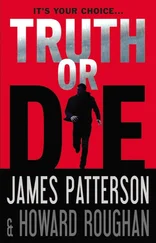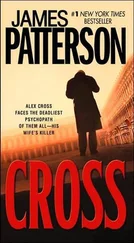I whispered, “I'm so sorry. I'm so sorry.”
“I'm the jerk who came here, Benjy. Oh, God, how long was he here? Three hours? I'm sorry. I didn't understand until now what those three days with him must have been like for you.”
She started crying again, and I hushed her, told her over and over that everything would be all right.
“Don't take this the wrong way,” she said, her voice ragged and strained. “But what makes you so sure?”
I got out of bed, opened my laptop, and booked two morning flights back to the States.
It was well after midnight, and I was still pacing the room. I took some Tylenol, got back under the covers with Amanda, but I couldn't sleep. I couldn't even shut my eyes for more than a few seconds.
The TV was small and old, but I turned it on and found CNN.
I watched the headline news, bolted upright when the talking head said, “Police have no suspects in the murder of Gina Prazzi, heiress to the Prazzi shipping fortune. She was found murdered in a room at the exclusive French resort Château de Mirambeau.”
When Gina Prazzi's face came on the screen, I felt as though I knew her intimately. I'd watched her pass in front of the camera in the hotel room, not knowing that her life was about to end.
I said, “Mandy, Mandy,” shook her arm. But she turned away, settled even more deeply into the feather bed and sleep.
I watched the police captain brief the press on TV, his speech translated and recapped for those just tuning in. Ms. Prazzi had checked into the Château de Mirambeau alone. The housekeepers believed that two people stayed in the room, but no other guest was seen. The police were not releasing any further information about the murder at this time.
That was enough for me. I knew the full story, but what I hadn't known was that Gina Prazzi was a real name , not an alias.
What other lies had Henri told me? For what possible reason? Why had he lied – in order to tell me the truth?
I stared at the TV screen as the anchor said, “In the Netherlands, a young woman was found murdered this morning in Amsterdam. What brings this tragedy to the attention of international criminalists is that elements of this girl's death are similar to elements of the murders of the two young women in Barbados, and also to the famous American swimsuit models who were murdered this spring in Hawaii.”
I dialed up the volume as the faces came on the screen: Sara Russo, Wendy Emerson, Kim McDaniels, and Julia Winkler, and now another face, a young woman whose name was Mieke Helsloot.
The announcer said, “Ms. Helsloot, twenty years old, was the secretary to the well-known architect Jan Van der Heuvel of Amsterdam, who was at a meeting in Copenhagen at the time of the murder. Mr. Van der Heuvel was interviewed at his hotel minutes ago.”
Jesus Christ. I knew his name.
The picture cut away to Van der Heuvel leaving his hotel in Copenhagen, suitcase in hand, journalists crowding around him at the bottom of a rounded staircase. He was in his early forties, had gray hair and angular features. He looked genuinely shocked and scared.
“I have only just now learned of this terrible tragedy,” he said into the clutch of microphones. “I am shocked and devastated. Mieke Helsloot was a proper, decent young lady, and I have no idea why anyone would harm her. It is a terrible day. Mieke was to be married.”
Henri had told me that Jan Van der Heuvel was an alias for one of the members of the Alliance, the man Henri called “the Dutchman.” Van der Heuvel was the third wheel who'd joined up with Henri and Gina during their romp through the French Riviera.
And now, soon after Henri had killed Gina Prazzi, Van der Heuvel's secretary had also been murdered.
If I hadn't once been a cop, I might have dismissed these two killings as a coincidence. The women were different types. They were killed hundreds of miles apart. But what I saw were two more flags on a grid, a part of a pattern.
Henri had loved Gina Prazzi, and he killed her. He'd hated Jan Van der Heuvel. Maybe he'd wanted to kill him, too, so, just thinking it out? what if Henri hadn't known that Van der Heuvel was in Denmark that day?
What if he'd decided to kill his secretary instead?
I woke up to sunlight seeping in through a small window. Amanda was lying on her side, facing away from me, her long, dark hair fanned out over the pillow. And in a flash, I was enraged as I remembered Henri in blackface, his gun pointed at Amanda's head, her eyes wild with fear.
Right then, I didn't care why Henri had killed anyone, what he was planning to do next, why the book was so important to him, or why he seemed to be spinning out of control.
Only one thing was important to me. I had to keep Mandy safe. And the baby, too.
I grabbed for my watch, saw that it was almost seven thirty. I shook Mandy's shoulder gently, and her eyes flew open. She gasped, then saw my face and sagged back into the bedding.
“I thought for a moment -”
“That it was a dream.”
“Yeah.”
I put my head very gently on her belly, and she stroked my hair.
“Is that the baby?” I asked.
“You dummy. I'm hungry.”
I pretended she was speaking for the baby. I made a little megaphone with my hands, called out, “Hellloooo in there, Foozle. This is Dad,” as though the tiny clump of our combined DNA could hear me.
Mandy cracked up, and I was glad she could laugh, but I cried in the shower, where she couldn't see me. If only I'd killed Henri when I had him in my gun sight. If only I had done that. Then it would all be over now.
I kept Mandy close to me as I paid the bill at the front desk and then hailed a cab and told the driver to take us to Charles de Gaulle airport.
Mandy said, “How can we go back to L.A.?”
“We can't.”
She turned her head and stared at me. “So what are we doing?”
I told Mandy what I'd decided, gave her a short list of names and numbers on the back of my business card, and told her that she'd be met when the plane landed. She was listening, not fighting with me, when I told her that she couldn't phone me, or send me e-mail, nothing. That she had to rest and eat good food. “If you get bored, think about the dress you want to wear.”
“You know I don't wear dresses.”
“Maybe you'll make an exception.”
I took a ballpoint pen out of my computer case and drew a ring on Mandy's left ring finger with lines radiating out from a big sparkly diamond in the center.
“Amanda Diaz, I love every bit of you. Will you marry me?”
“Ben.”
“You and Foozle.”
There were happy tears rolling down our cheeks now. She threw her arms around me, said, “Yes, yes, yes,” and swore she wouldn't wash off the ring I'd drawn until she had a real one.
I bought breakfast for us at the airport, chocolate croissants and café au lait, and when it was nearly time to board, I walked with her as far as I could go. Then I wrapped my arms around her, and she sobbed against my chest until I was crying again, too. Could anything be scarier than this? The thought of losing someone you love so much? I didn't think so.
I kissed Mandy's poor bruised mouth again and again. If love counted for anything, she would be safe. Our baby would be safe. And I would see them both soon.
But the opposing thought went through me like a lance. I might never see Amanda again. This could be the end for us.
I dried my eyes with the palms of my hands, then watched Mandy go through the checkpoint. She looked back, waved, threw kisses, then turned away.
When I couldn't see her any longer, I left the airport, took a cab to the Gare du Nord, and boarded a high-speed train to Amsterdam.
Читать дальше












